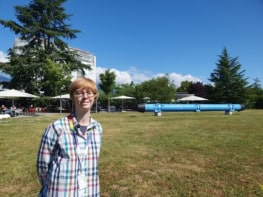Sabine Hossenfelder is a science writer and theoretical physicist who studies quantum gravity. She is a research fellow at the Frankfurt Institute for Advanced Studies where she leads the Emergent Gravity group. Hossenfelder is the author of the popular-science book Lost in Math: How Beauty Leads Physics Astray, blogs at backreaction.blogspot.com and has a popular YouTube channel “Science without the gobbledygook”.

What skills do you use every day in your job?
Primarily I use maths, mostly specialized techniques that build on what I learned during my PhD, but on occasion there’s some area of maths that is new to me and that I have to learn from scratch. I also quite frequently draw on what I learned about making graphs and figures. I don’t do coding myself any more, but I occasionally do some numerical analysis. I have had to learn to cope with Excel spreadsheets to make finance people happy, but luckily, I don’t have to deal with that a lot.
What I do in science communication I learnt largely by trial and error. After 15 years, I hope that I have most beginners’ mistakes behind me. The most important things I need today that I didn’t learn anything about during my education are proposal writing and online literature searching. My time- and people-management is greatly aided by free online services for notes, lists and reminders, which are especially helpful for organizing conferences, or keeping track of long-time projects that involve people I don’t meet frequently.
What do you like best and least about your job?
It’s the research part that I like best about my job; it’s what I came for. I like to dig into a topic I am interested in, find out what people have done, and add my own ideas. While I don’t like it, I understand the reason for most of the paperwork I have to do, such as filing in reports and filling out forms – it makes sense that every once in a while, I should explain what I have done with my time and money. I don’t enjoy travelling and I am not particularly social, but going to conferences and giving lectures and seminars is a necessary part of the job. I have found that practice makes it easier, and I have learned to say “no” if I feel that travelling and social commitments are becoming too stressful.
Proposal writing and administrating funds are tedious tasks and I don’t enjoy them – but again I understand it’s mostly necessary (though in some cases it feels excessive, in particular European Research Council proposals spring to mind). The part about my job that bothers me most is the need to work on something that is popular or to work with people who are popular. I have always had, and still have, trouble funding my research because I tend to be interested in topics that few of my colleagues find relevant. I almost left academia because of this several times, and I still feel every other year that academia just isn’t for me. If I can only get funding to work on research I don’t consider promising, then what’s the point?
What do you know today, that you wish you knew when you were starting out in your career?
I know now that 20 years later I am still working in the same field. In light of this, the advice I’d give to students and postdocs who want to stay in academia is to think about long-term prospects. Research trends come and go, and when they go, you’ll be better off if you’re not a one-trick pony, so don’t specialize too early.
Also, don’t feel like you have to continue working on the topic of your PhD. The younger you are (“young” in working years after PhD) the easier it is to get financial support for individual research. Use this time wisely. Once you’re 10+ years past your PhD, it’ll get much more difficult. Having said this, I know a lot of people who left academia, and few of them regret it. So don’t feel like leaving means failure; it’s not. Maybe the most important advice I have is to pay attention to your work–life balance. If you are permanently stressed and burned out, your research will suffer. So if you need time off, don’t be apologetic about it.



